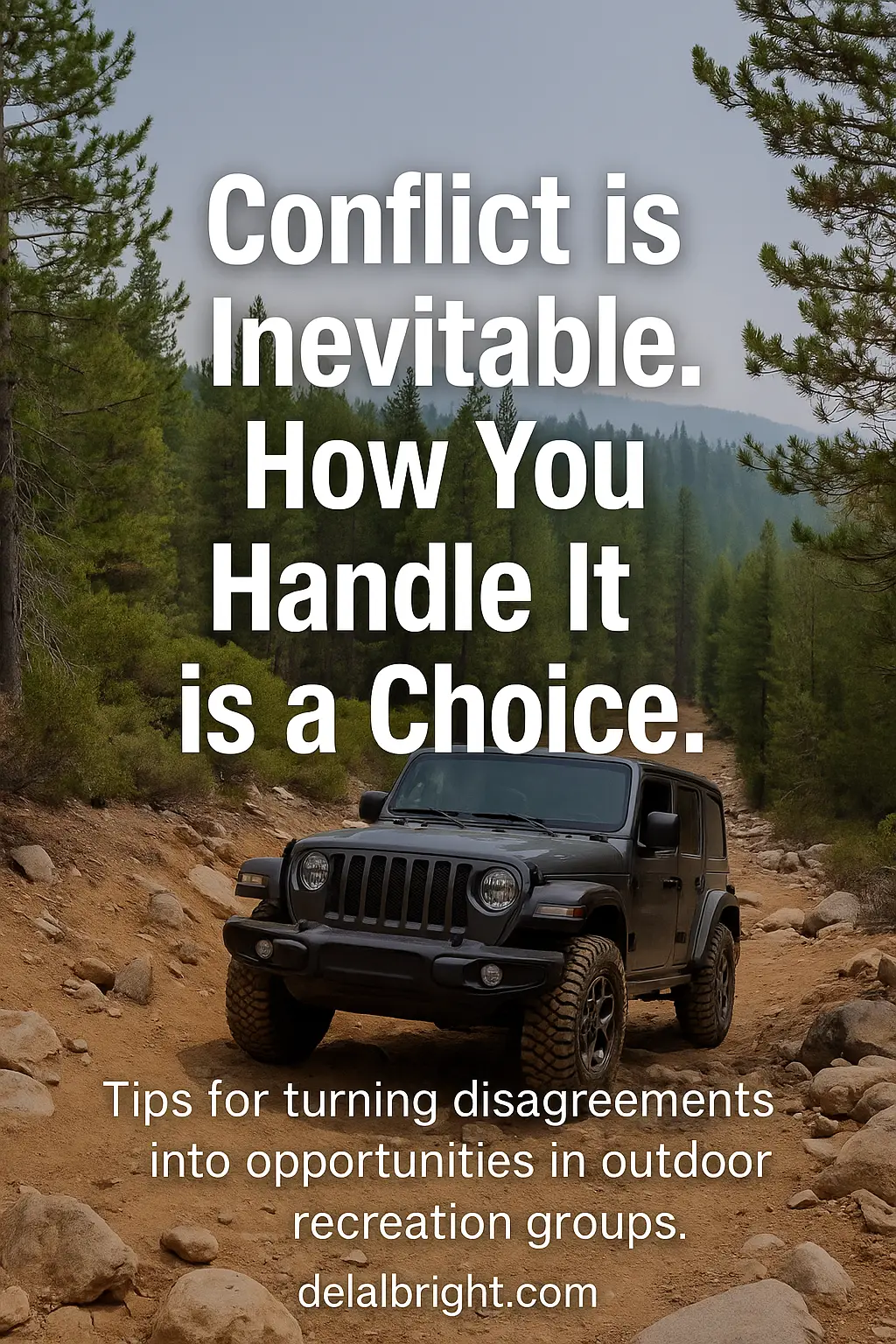Conflict: Smart Strategies for Turning Disagreements into Opportunities
Conflict is part of life. Anytime people share ideas and opinions—especially about something they’re passionate about—disagreements are bound to surface. That’s conflict. It doesn’t mean the end of the world, and it doesn’t always have to be negative.
In outdoor recreation, particularly in motorized groups, conflict arises just as it does in relationships, politics, or the workplace. The key is not avoiding it (because you can’t), but learning how to handle it, even harness it, in a constructive way.
Ultimately, you have the power to choose how you respond. You also have the power to decide what you will or will not allow into your peace of mind. Those two words—choose and allow—are some of the most powerful in the dictionary.
“I choose not to get caught up in your garbage. And I’m not going to allow you to ruin my day.”
(Just don’t try that line on a police officer—trust me, it doesn’t go over well!)
Why Conflict Isn’t Always Bad
Conflict means people are speaking up. It means ideas are on the table, new perspectives are being offered, and maybe even new doors are being opened. Sure, it can also mean a few sleepless nights and some frustration, but that’s the price of passionate people working together.
The goal isn’t to eliminate conflict but to manage it. To keep it from twisting up your guts, ruining your day, or shutting down communication.
Here are some ways to embrace conflict and turn it into something useful.
1. Accept That Conflict is Natural
When people share opinions, especially in our motorized recreation volunteer world, differences will arise. That’s normal. If we all thought alike, we’d still be carrying clubs and living in caves. Recognize conflict as a chance to learn—not a threat.
2. Communicate Clearly
Most unnecessary conflict comes from poor communication. Make sure what you say is what your listener actually hears. Be clear, be direct, and check for understanding. Don’t get your knickers in a twist over a simple misunderstanding. To avoid unnecessary conflict, I like to use “aerobic listening” (stronger than “active listening”) where you say back what you heard the speaker say, in your own words. This ensures you heard right!
3. Keep the High Ground
In both politics and recreation groups, staying calm and sticking to your points is crucial. Take notes. Write down your key ideas. Repeat them if needed until they’re understood. Just like in military strategy, maintaining the high ground matters.
4. Don’t Let Emotions Run the Show
When you feel like you’re about to blow, step back, breathe, and regroup. Pull out your notes if you need to. Objectivity carries more weight than emotion. Once you blow, your listener is likely to do the same and emotions rule – and the communication ends.
5. Find the Root of the Problem
Some conflicts are real; others are just political theater or attention-seeking. If it’s the latter, no amount of logic will solve it. Call it what it is and don’t waste your energy. Dig into the situation until you can see the real root of the issue – not just the outer layer of fluff, attention-getting, anger or theatrics.
6. Agree on Ground Rules
If conflict is genuine, set some parameters. For example: avoid each other’s hot buttons. Agree to argue fairly without personal attacks. Establishing ground rules can keep disagreements from spiraling. Like in good meeting facilitation, we must stay focused on the subject, the content, and not the personalities.
7. Trust Your Instincts
Sometimes, conflict is worth pushing through. If that little voice tells you giving up now will cost you more later, hang in there. Other times, the smart move is to step back. Trust your gut—and the wisdom of people you respect.
8. Stay Focused in Recreation Advocacy
In motorized recreation, you’ll face the same kind of irrational or emotional arguments you see in politics. Some folks stage scenes to sway opinion. Don’t get pulled into the drama. Stick with the facts, your bullet points, and your message. It’s always amazing to me to see people “fighting” over something we all love. Just practice staying focused on our objective – recreation advocacy.
9. Use Tools That Keep You Grounded
In leadership training I offer, I recommend keeping your key points handy—on 5×7 cards, a notepad, or your phone. Whether you’re public speaking or debating in a meeting, notes keep you grounded and confident. Staying grounded helps keep your emotional reactions in check.
10. Know When to Shift Tactics
Sometimes, your best efforts won’t resolve the conflict. The other party may not play by the same rules. At that point, you may need to adjust your approach.
If you do, plan it first. Be clear on your objectives. Brainstorm the consequences. Then proceed with confidence—but know you may be giving up some high ground.
Like my mom always said:
“Just because Johnny does it, doesn’t mean you get to do it.”
(Back then Johnny was sniffing glue… and I’m glad I listened to mother!)
Final Thoughts
Conflict is unavoidable—but it can also be valuable. If you can recognize it, manage it, and harness its energy, you’ll discover new opportunities you might have missed.
By staying calm, communicating clearly, and choosing how you react, you won’t just survive conflict—you’ll turn it into something useful. And maybe even sleep better at night.
LEARN all the tips and tricks in volunteerism in my book here on Amazon.
READ more about what clubs and groups to join in motorized recreation here.

